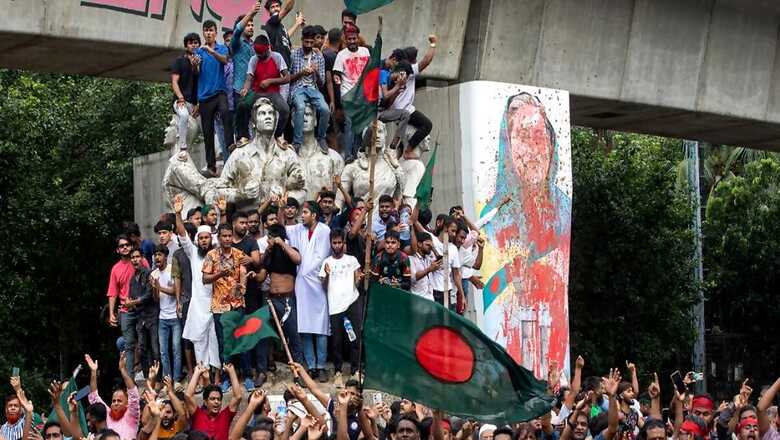
views
The obliterated Bamiyan Buddhas of Afghanistan and the vandalised statue of Sheikh Mujibur Rahman in Bangladesh stand as solemn testaments to a resplendent past now obscured by the fervour of belief. Islamic fundamentalism, ensnared by its own history, engenders a disquieting duality within its adherents. This selective amnesia delineates the contemporary contours of Bangladesh.
The nation has witnessed an Islamic revolution, stealthily supported by a military coup apparently engineered brilliantly by the CIA, sidelining China. For India, the aftermath of investing wholly in Sheikh Hasina’s leadership parallels the West’s predicament following the Shah’s ousting in Iran. Thankfully, Bangladesh’s economic and military clout pales in comparison to Iran’s, affording India numerous strategic options, starting with its advantageous geography.
The Ascendancy of Jamaat-e-Islami
Since its inception, a considerable segment of Bangladesh has supported the Jamaat-e-Islami, a group that envisions an Islamic state and targets non-Muslims. This ideological zeal, capable of subsuming nationalism and condoning mass atrocities, underscores the formidable influence of the mosque. The ostensible bipartite political structure conceals an Islamist substratum.
However, as the Arab Spring demonstrated, true power emanates from the gun’s barrel. The Bangladeshi military, unwilling to relinquish its political dominion, will cut the Jamaat to size and may even exile and arrest those whom it currently supports.
The Spectre of Regime Change
Apparently, the CIA has deftly orchestrated civil unrest and facilitated regime change, likely resulting in unwavering support for a quasi-permanent US military presence. However, a potential Trump administration might abruptly forsake Bangladesh, rendering this arrangement precarious.
Economically, Bangladesh is poised to suffer significantly. The phenomenal economic progress achieved under Sheikh Hasina’s stewardship, marked by unparalleled prosperity, is in jeopardy. For the devout, however, economic stability and growth are secondary to ideological fervour.
Bangladesh’s economy, heavily reliant on textiles, is particularly vulnerable, with 85 per cent of exports rooted in this sector and 25 per cent of these factories under Indian ownership. This leverage could be instrumental should Bangladesh continue its antagonistic stance. India could incentivise the relocation of manufacturing to its own territory.
If the interim government doesn’t pragmatically deal with the situation, be prepared for an impoverished, radicalised, Islamic Bangladesh. In such a case, Bangladesh will be reduced to a densely populated, dangerously radical ragtag nation on the brink of implosion. One hopes better sense prevails with the new rulers of Dhaka.
The writer is a senior journalist with expertise in defence. Views expressed in the above piece are personal and solely those of the author. They do not necessarily reflect News18’s views.


















Comments
0 comment